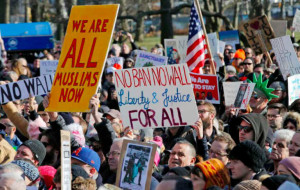Trump must really like Duterte, or he just doesn’t care about Abu Sayyaf’s recent beheading in the Philippines.
His Travel Ban 2.0 doesn’t add any countries to the list. In fact, it subtracts Iraq, after that country lobbied extensively.
Six out of the seven original countries are still included: Iran, Libya, Somalia, Sudan, Syria and Yemen.
There are also exceptions made for green card and visa holders, as well as those who travel for work, or young people who need medical care. (It specifies children, not older persons.)
All of that intended to sanitize the Travel Ban 1.0 which has been blocked by the courts. This new one revokes the old one but still contains some nasties.
The new executive order also suspends the refugee program for 120 days, limits the number of refugees in 2017 to 50,000, and does not single out Syrians.
All good? Not exactly.
No matter how you slice it, the travel ban is still a Muslim ban, which raises constitutional questions.
One aspect of the ban I’ve found rarely talked about is in Section 11.
“Transparency and Data Collection” sounds benign.
But not when its intent is to provide the country with what essentially is a national scoreboard on terrorism.
It’s going to be the unofficial official Muslim Report Card.
According to the executive order itself, information will be gathered on the number of foreign nationals in the U.S. charged or convicted of terrorism; or removed based on terrorism-related activity.
These aren’t travelers, mind you. These are people in the U.S. living in immigrant communities that the government wants tracked.
“Information regarding the number of foreign nationals in the United States who have been radicalized after entry into the United States and who have engaged in terrorism-related acts, or who have provided material support to terrorism-related organizations in countries that pose a threat to the United States.”
There are even specific crimes the government is interested in, such as “the number and types of acts of gender-based violence against women, including so-called ‘honor killings,’ in the United States by foreign nationals.”
And then there’s the catch-all. The government wants “any other information relevant to public safety and security as determined by the Secretary of Homeland Security or the Attorney General.”
Oh, that would be Jeff Sessions.
He’ll have so much time on his hands since he’s recused himself on any Trump Russia matters.
And all this is in something called a travel ban?
Sounds like they’re gearing up for a Muslim Ban 3.0 that will last longer than 90 days (120 days for refugees).
If they have data, and everyone loves data these days, you can justify banning just about anyone in Trump’s America for as long as Steve Bannon wants.
Forever?
So far only Hawaii has challenged the new executive order.
A federal judge in that state has agreed to hear a challenge to the ban and will hear the case the day before the executive order is to take effect.
“Sections 2 and 6 of the March 6, 2017 Executive Order violate the Immigration and Nationality Act by discriminating on the basis of nationality, ignoring and modifying the statutory criteria for determining terrorism-related inadmissibility, and exceeding the President’s authority under the Immigration and Nationality Act,” Hawaii Attorney General Douglas Chin said in a statement.
Section 2 temporarily suspends entry for “Nationals of Countries of Particular Concern” during a review period, which could be as long as 150 days from March 16.
Section 6 is the realignment of the U.S. Refugees Admissions program, which suspends travel of refugees and subjects them to what the administration likes to call “extreme vetting.”
“The new executive order is resulting in the establishment of religion in the state of Hawaii contrary to its state constitution; it is inflicting immediate damage to Hawaii’s economy, educational institutions, and tourism industry; and it is subjecting a portion of the state’s citizens to second-class treatment and discrimination, while denying all Hawaii residents the benefits of an inclusive and pluralistic society,” attorneys for the state argued in court filings.
“The executive order means that thousands of individuals across the United States and in Hawaii who have immediate family members living in the affected countries will now be unable to receive visits from those persons or to be reunited with them in the United States.”
Hawaii is as diverse as America gets, and attorney Chin said in reports that the discriminatory order is a violation of the state’s history, it’s culture and constitution.
But it may or may not be enough to stop the initial ban.
If TB 2.0 passes, it takes America another step forward toward an isolated, closed society that’s not just less open, but smaller, and certainly not as great as it ever was.
That’s why I’ve always said America under Trump is its diminishment.
Emil Guillermo is a veteran journalist and commentator. He writes from Northern California. Contact: https://www.twitter.com/emilamok


